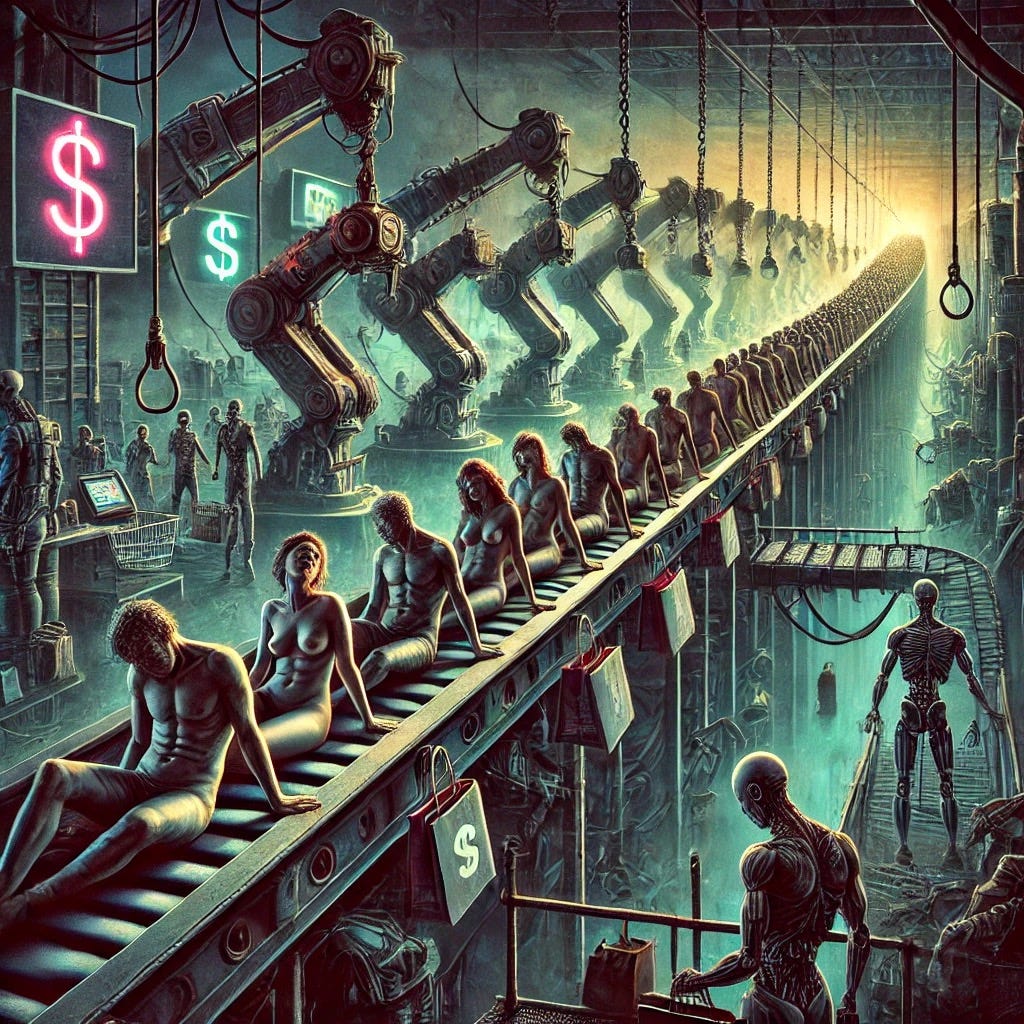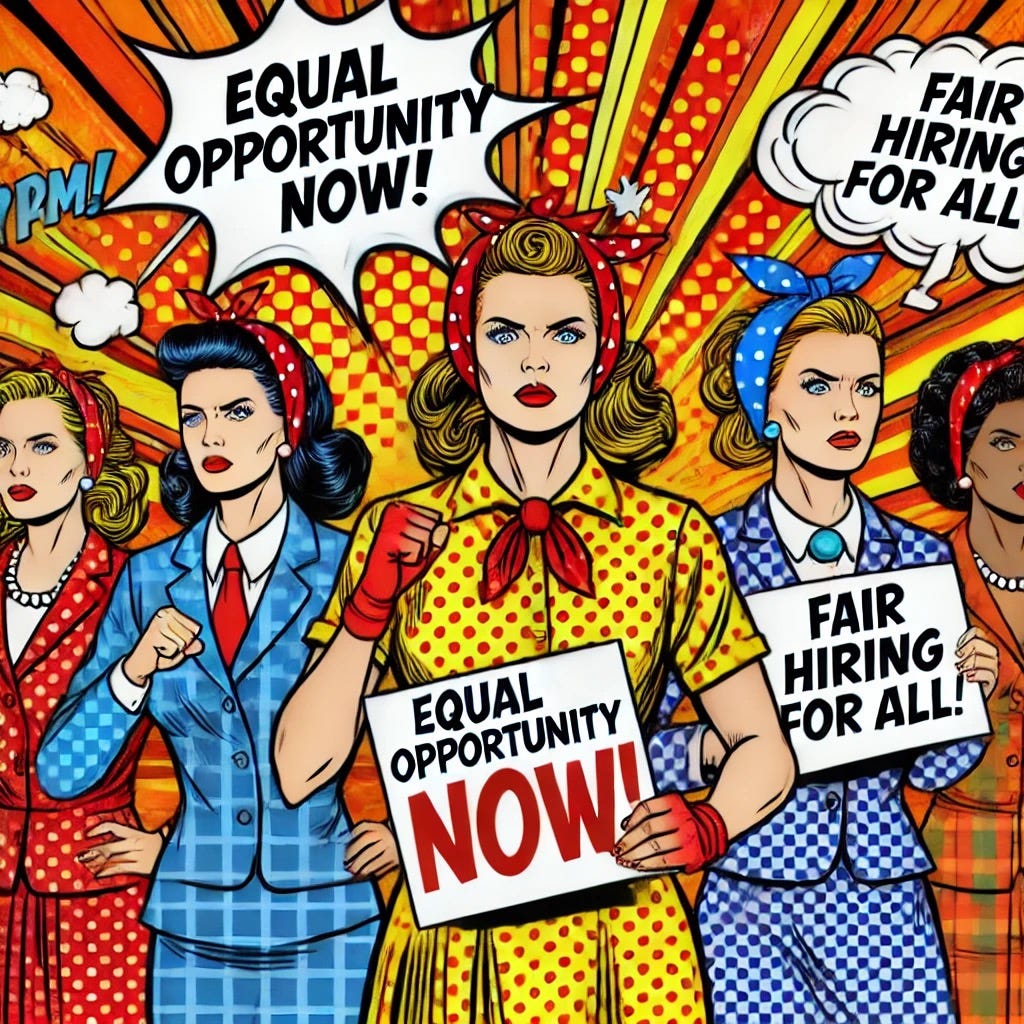The Consequences of Artificial Equality: How Emancipation Reshaped Gender Dynamics and Society
After touching on First-Wave feminism recently, I was confronted with the realization that it just didn’t go far enough. While inspired to expound, I am reluctant to wade into anything that can be misconstrued as ‘trad’ or as an argument for rigid, outdated gender roles. But in order to expound with accurate historic context, this is where we must start. More will follow, but this is where we start.
My goal is not to suggest that men and women should be confined to a past that no longer exists. However, I do believe that in the pursuit of artificial equality, we have overlooked something fundamental: our biological distinctions are not flaws to be erased but unique characteristics that give men and women their own strengths. These differences are not just important; they are what make us beautiful and inherently compatible.
Rather than appreciating and working with our natural traits, society has instead tried to force a sameness between men and women that does not align with reality. This well intentioned but flawed attempt to create absolute equality has led to unintended consequences. Women have had to adopt masculine traits to compete in a workforce designed around male strengths, while men have softened their edges to adapt to shifting social expectations. This artificial leveling has not only confused individual identity but has also reshaped family life, child rearing, and even governance, creating a conveyor belt society where efficiency and uniformity are prioritized over genuine human connection.
The Gender Role Shift: Women Becoming Masculine, Men Becoming Feminine
Historically, gender roles developed in response to biological realities. Men, with their higher levels of testosterone, natural competitiveness, and physical strength, were suited for leadership in war, labor, and high risk endeavors. Women, possessing greater empathy, emotional intelligence, and maternal instincts, were more naturally inclined toward caregiving, social bonding, and nurturing future generations. This was not oppression, it was balance.
However, rather than appreciating these distinctions, emancipation attempted to make men and women equals in all aspects of life, including those where biological differences play a crucial role. As women entered the workforce en masse, they found themselves in direct competition with men in professional and political spheres that had been shaped around male patterns of work and ambition. To succeed, they had to adopt traditionally masculine traits: assertiveness, competitiveness, and emotional detachment.
Meanwhile, men, in order to fit into a shifting world that increasingly valued qualities associated with femininity, began softening their demeanor. The expectation of deference, heightened emotional expressiveness, and passivity became more pronounced in male behavior. While balance between masculine and feminine traits is natural, the forced reshaping of gender expression left both men and women struggling to find harmony in their personal and professional lives.
The Breakdown of Family and Child Rearing
One of the most profound consequences of this artificial equality has been the restructuring of family life. In the past, mothers were the primary caregivers, providing their children with nurturing attention that laid the foundation for emotional security. With both parents now working, children are increasingly raised by strangers in institutions like daycare centers, preschools, and kindergartens, where the primary focus is not on quality care, but on efficiency, structure, and mass management.
This shift can be also be described as conveyor belt parenting, just as Children are socialized within a system that prioritizes order, uniformity, and compliance over genuine human connection. The result is a generation that is more dependent on institutions, less emotionally secure, and more susceptible to coercive governance structures. The intimate family unit, once the backbone of society, has been replaced by a state supervised system of mass upbringing.
The Rise of Sameness and Affirmative Action
As society pushed for sameness rather than appreciation of differences, affirmative action policies were introduced to artificially balance the scales. Rather than focusing on merit, these policies aimed to enforce statistical equality in the workplace, creating resentment on both sides.
Men who were once judged on competence found themselves overlooked in favor of diversity quotas, while women who succeeded often faced the burden of proving they had earned their position rather than being placed there for the sake of equality. Rather than fostering cooperation between the sexes, these policies deepened the divide, pitting men and women against each other in professional spaces that became more about representation than genuine capability.
The result was not fairness but conflict. Women, feeling the pressure to perform in male dominated fields, often faced burnout from suppressing their natural inclinations, while men, deprived of opportunities based on merit, grew frustrated and disillusioned. The pursuit of artificial equality created a work environment rife with suspicion, resentment, and mistrust rather than one of mutual respect and collaboration.
The Unintended Consequences of Gender Automation
At its core, the forced equalization of men and women has led to a broader societal automation, not just of the workforce, but of human belief and behavior. The natural differences between the sexes, once a source of complementary strength, have been flattened into a system that values uniformity over individuality.
This has played into the hands of corporations and governments that benefit from a more predictable, controllable population. When individuals lose touch with their biological instincts and innate strengths, they become more reliant on external structures for guidance and purpose. The weakening of traditional families and the rise of institutional child rearing make people more dependent on state and corporate entities, while the erosion of natural gender distinctions leads to confusion about identity and purpose.
The attempt to artificially equalize men and women, despite their clear biological differences, has led to profound unintended consequences. Women have been pushed to embody masculine traits to compete, while men have softened themselves to fit into a new social order. This disruption has led to the breakdown of the family, the rise of conveyor belt child rearing, and increasing tensions in the workplace and beyond.
True equality does not come from forcing men and women into the same mold, but from appreciating their differences and allowing each sex to thrive in its own way. Rather than suppressing these distinctions in pursuit of an artificial sameness, we should celebrate them as the foundation of a balanced and flourishing society.








Wow look they are talking about you and your article! https://bleeped.net/files/artificial_equality.mp3
Exactly! Reminds me of my conversation just last night with a teacher buddy Mike, who lives in Hawaii. He was talking about how the family structure has been so corrupted that it creates frustrating challenges with the children he teaches. He's between a rock (the parents) and a hard place (school admin) and told to "watch what you say in the classroom" for saying things that 10 years ago would have been fine. But these parents are so confused about their overall roles in life, including gender, that their children are nervous wrecks. I'd love to see you go further into addressing how this sexual confusion is affecting attraction, romance, and dating!